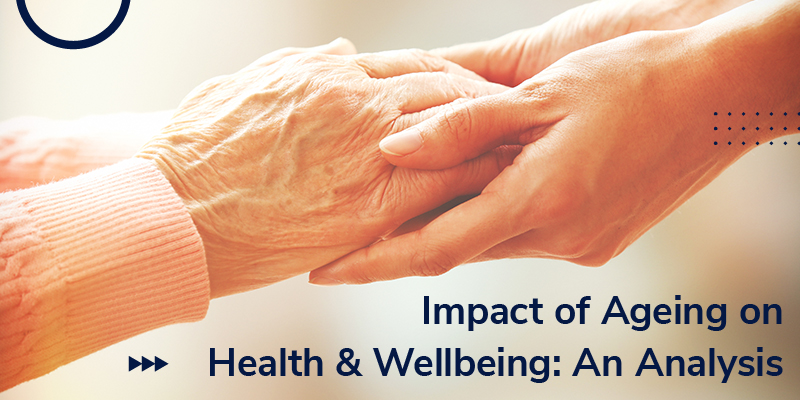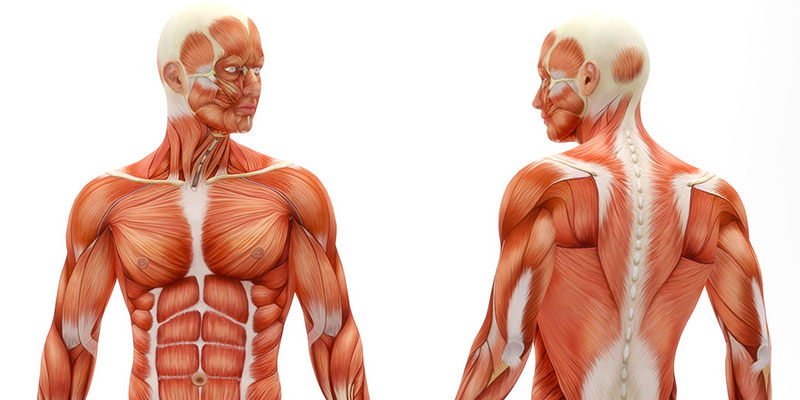
Impact of Ageing on Health & Wellbeing: An Analysis
The Clock Is Ticking
Is aging a blessing or a curse? Well, that's quite a debatable question, but one thing is certain: Aging is unstoppable and irreversible. Once you cross the threshold of thirty years, your body transforms, preparing itself for the years to come.
The clock is ticking, and whether we know it or not, our behavior changes according to our lifestyle. Like a domino effect, these lifestyle changes impact our health as we age. That is why REAN Foundation serves as a platform that makes health and wellness management affordable and accessible.
Our article explores how aging and its consequential behavioral changes impact overall health and wellbeing.
The Impact Of Sarcopenia & Its Influencing Factors

Medical experts say that the process of aging commences once we reach thirty. Of course, you are young, alive, and kicking! But this is the age when we start losing our muscle mass. Medically, the loss of muscle mass due to aging is termed Sarcopenia. According to experts, we tend to lose at least 3-5% of muscle mass every decade after thirty years of age.
Sarcopenia is an ongoing process influenced by:
The loss of muscle mass is tied to these factors, which is why we need to gear up and act to save it- whether it is muscle mass or your brain cells. The following graph will help you understand the relationship between age, skeletal muscle mass, and its influencing factors.
Highly influenced by our lifestyle choices, the graphical curves can either go up or down. A healthy lifestyle with increased physical activity, sensible food, and personal habits will help to keep the curve upward and onward.
However, a sedentary lifestyle and habits like smoking and drinking will accelerate the curve to a downward spiral. It translates to a rapid loss of muscle cells leading to quicker muscle loss. Therefore, it is clear that we must aim for an upward curve, if not a normal one, as long as age and skeletal muscle mass are concerned.
Let's shift our focus to the factors that influence loss of muscle mass:
Nothing can change your genetic attributes, such as the quality of your brain and muscle cells. Some people are genetically predisposed to having lean body mass. This could be a disadvantage since it can expedite Sarcopenia. On the contrary, those genetically blessed with less fat and more muscle mass will lose muscle at a slower rate even as they age.
Environmental factors always have a great impact on longevity. The air we breathe, the water we drink, and the food we consume dictate our health during our lifetime. Your longevity also depends on the availability and the quality of healthcare services in your locality.
These factors, including genetics, are not under your control. The only factor that is in your hands is your lifestyle.
3 Crucial Lifestyle Factors That Influence Aging

Essentially, your lifestyle comprises your attitude, health choices, opinions, interests, and behaviors. Your health choices are dictated by three factors directly linked to your longevity and aging.
A balanced diet does not only mean taking adequate proportions of carbohydrates, proteins, fat, and fibers. It also means knowing how much to eat depending on your activity level. Excessive food intake and lesser physical activity are a recipe for disaster. When the extra calories are not burnt, they are converted to fat and deposited in your body. It inevitably leads to an increase in body weight, which leads to a host of health complications.
Exercising is ideal for maintaining your body weight, bone strength, and muscle mass as you age. Experts say that maintaining ideal body weight and BMI (Body Mass Index) of 19-25 at the age of fifty adds another seven years to your life. Also, a recent study by Harvard University explains the importance of factors like:
The study says that these factors can add 14 years of longevity for women and 12 years for men. Therefore, if you are overweight or obese, your ultimate goal should be to regain your fitness and ideal weight before your fiftieth birthday.
In the current scenario, mental fitness is highly prioritized as it is closely linked to physical fitness and overall wellbeing. Mental fitness is greatly affected by stress compounded by many factors, especially as we age.
Prolonged mental stress impacts your peace of mind and sleep, resulting in disastrous, life-threatening ailments. Here are some ideas to maintain your mental fitness:
In a nutshell, physical fitness, health checkups, and mental wellbeing can help you lead a stress-free, happy life no matter what your age.
Impact Of Aging On Brain Cells

Another organ that undergoes continual change with age is your brain. The countdown to brain shrinkage starts in your thirties and increases when you reach sixty. Brain shrinkage, medically termed Atrophy, is characterized by islands of dark fluid that fill the spaces when the brain shrinks.
This pictorial graph represents the relation between total brain volume and age.
As per this graph, brain degeneration starts at thirty and slowly progresses with every passing decade. The brain loses neurons, and the size of the ventricles increases. However, there is good news. You can slow down the rate of brain degeneration by staying mentally and physically fit.
There are 90-year olds who visit the gym every day. Some of them even do cross-fit, cycling, and some form of physical activity that defies their age. That said, we do come across septuagenarians who are extremely frail.
Frailty or loss of muscle and bone mass and brain cells is a concept that's gaining prominence in Geriatrics. It is characterized by weight loss, low physical activity, and general weakness associated with adverse health outcomes. Frailty also manifests itself as a biological vulnerability and poor physiological reserves.
Therefore, elderly adults with frailty are more vulnerable to diseases and succumb to infections due to the lack of physiological reserves. For example, a healthy athlete will be able to combat pneumonia better than a frail person.
The current Covid19 pandemic is an ongoing example of how frailty and chronic diabetes can put elderly lives at risk. It is a fact that many older adults with hypertension, diabetes, and obesity have succumbed to the disease.
It's not how old you are; it's how you are old!
Aging gracefully is an art that is impossible without physical and mental fitness. Aging is unavoidable, but you can avoid health problems, stress, and frailty. You can be a hundred years old and still effortlessly do a set of pushups.
Your health should be your top priority as you age. REAN Foundation helps you keep a check on your health with our HealthGuru App. Swing by here for more details.
The Clock Is Ticking
Is aging a blessing or a curse? Well, that's quite a debatable question, but one thing is certain: Aging is unstoppable and irreversible. Once you cross the threshold of thirty years, your body transforms, preparing itself for the years to come.
The clock is ticking, and whether we know it or not, our behavior changes according to our lifestyle. Like a domino effect, these lifestyle changes impact our health as we age. That is why REAN Foundation serves as a platform that makes health and wellness management affordable and accessible.
Our article explores how aging and its consequential behavioral changes impact overall health and wellbeing.
The Impact Of Sarcopenia & Its Influencing Factors

Medical experts say that the process of aging commences once we reach thirty. Of course, you are young, alive, and kicking! But this is the age when we start losing our muscle mass. Medically, the loss of muscle mass due to aging is termed Sarcopenia. According to experts, we tend to lose at least 3-5% of muscle mass every decade after thirty years of age.
Sarcopenia is an ongoing process influenced by:
The loss of muscle mass is tied to these factors, which is why we need to gear up and act to save it- whether it is muscle mass or your brain cells. The following graph will help you understand the relationship between age, skeletal muscle mass, and its influencing factors.
Highly influenced by our lifestyle choices, the graphical curves can either go up or down. A healthy lifestyle with increased physical activity, sensible food, and personal habits will help to keep the curve upward and onward.
However, a sedentary lifestyle and habits like smoking and drinking will accelerate the curve to a downward spiral. It translates to a rapid loss of muscle cells leading to quicker muscle loss. Therefore, it is clear that we must aim for an upward curve, if not a normal one, as long as age and skeletal muscle mass are concerned.
Let's shift our focus to the factors that influence loss of muscle mass:
Nothing can change your genetic attributes, such as the quality of your brain and muscle cells. Some people are genetically predisposed to having lean body mass. This could be a disadvantage since it can expedite Sarcopenia. On the contrary, those genetically blessed with less fat and more muscle mass will lose muscle at a slower rate even as they age.
Environmental factors always have a great impact on longevity. The air we breathe, the water we drink, and the food we consume dictate our health during our lifetime. Your longevity also depends on the availability and the quality of healthcare services in your locality.
These factors, including genetics, are not under your control. The only factor that is in your hands is your lifestyle.
3 Crucial Lifestyle Factors That Influence Aging

Essentially, your lifestyle comprises your attitude, health choices, opinions, interests, and behaviors. Your health choices are dictated by three factors directly linked to your longevity and aging.
A balanced diet does not only mean taking adequate proportions of carbohydrates, proteins, fat, and fibers. It also means knowing how much to eat depending on your activity level. Excessive food intake and lesser physical activity are a recipe for disaster. When the extra calories are not burnt, they are converted to fat and deposited in your body. It inevitably leads to an increase in body weight, which leads to a host of health complications.
Exercising is ideal for maintaining your body weight, bone strength, and muscle mass as you age. Experts say that maintaining ideal body weight and BMI (Body Mass Index) of 19-25 at the age of fifty adds another seven years to your life. Also, a recent study by Harvard University explains the importance of factors like:
The study says that these factors can add 14 years of longevity for women and 12 years for men. Therefore, if you are overweight or obese, your ultimate goal should be to regain your fitness and ideal weight before your fiftieth birthday.
In the current scenario, mental fitness is highly prioritized as it is closely linked to physical fitness and overall wellbeing. Mental fitness is greatly affected by stress compounded by many factors, especially as we age.
Prolonged mental stress impacts your peace of mind and sleep, resulting in disastrous, life-threatening ailments. Here are some ideas to maintain your mental fitness:
In a nutshell, physical fitness, health checkups, and mental wellbeing can help you lead a stress-free, happy life no matter what your age.
Impact Of Aging On Brain Cells

Another organ that undergoes continual change with age is your brain. The countdown to brain shrinkage starts in your thirties and increases when you reach sixty. Brain shrinkage, medically termed Atrophy, is characterized by islands of dark fluid that fill the spaces when the brain shrinks.
This pictorial graph represents the relation between total brain volume and age.
As per this graph, brain degeneration starts at thirty and slowly progresses with every passing decade. The brain loses neurons, and the size of the ventricles increases. However, there is good news. You can slow down the rate of brain degeneration by staying mentally and physically fit.
There are 90-year olds who visit the gym every day. Some of them even do cross-fit, cycling, and some form of physical activity that defies their age. That said, we do come across septuagenarians who are extremely frail.
Frailty or loss of muscle and bone mass and brain cells is a concept that's gaining prominence in Geriatrics. It is characterized by weight loss, low physical activity, and general weakness associated with adverse health outcomes. Frailty also manifests itself as a biological vulnerability and poor physiological reserves.
Therefore, elderly adults with frailty are more vulnerable to diseases and succumb to infections due to the lack of physiological reserves. For example, a healthy athlete will be able to combat pneumonia better than a frail person.
The current Covid19 pandemic is an ongoing example of how frailty and chronic diabetes can put elderly lives at risk. It is a fact that many older adults with hypertension, diabetes, and obesity have succumbed to the disease.
It's not how old you are; it's how you are old!
Aging gracefully is an art that is impossible without physical and mental fitness. Aging is unavoidable, but you can avoid health problems, stress, and frailty. You can be a hundred years old and still effortlessly do a set of pushups.
Your health should be your top priority as you age. REAN Foundation helps you keep a check on your health with our HealthGuru App. Swing by here for more details.



